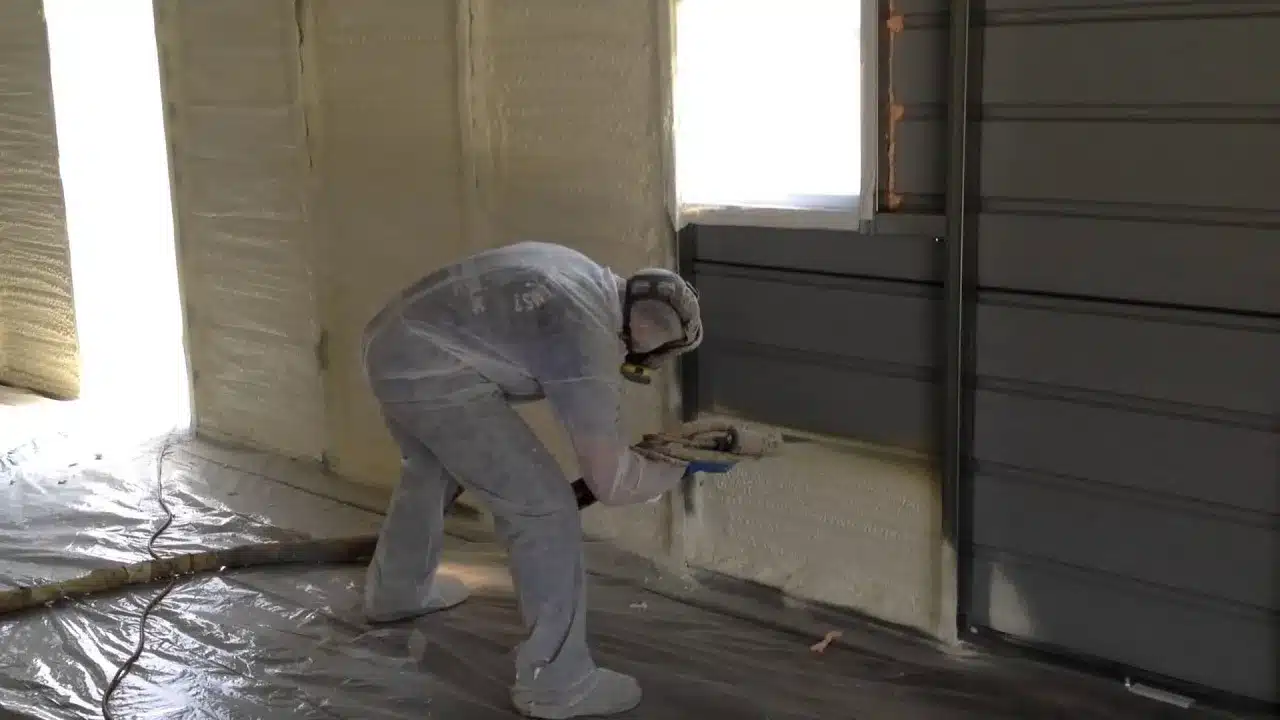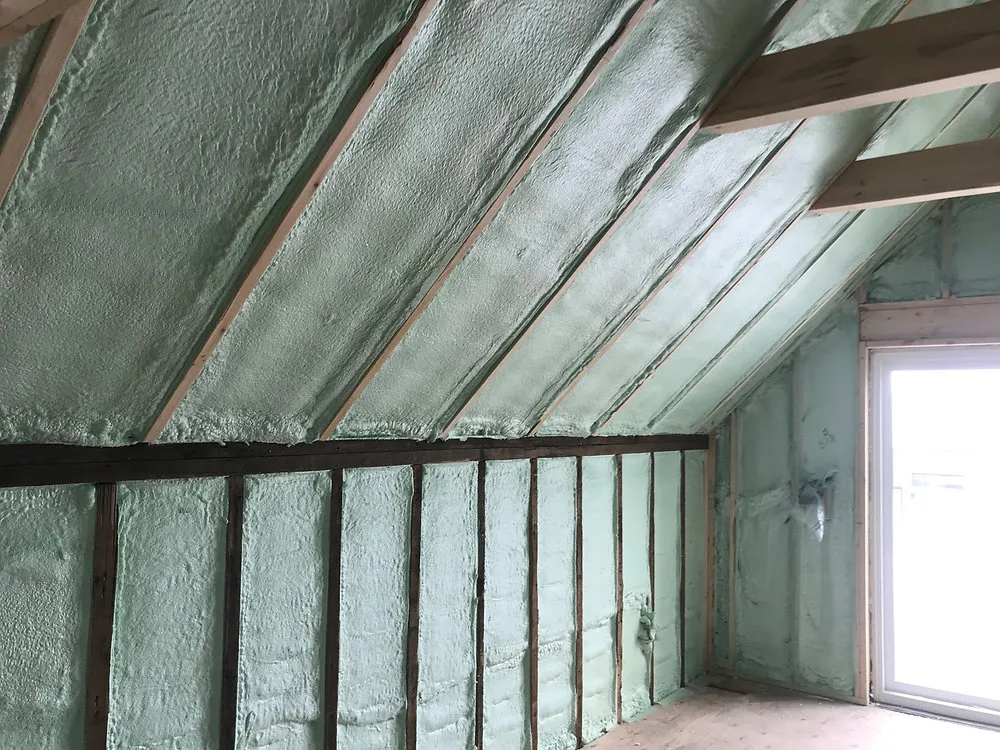Closed-cell spray foam insulation offers superior performance for Raleigh properties through its exceptional thermal resistance (R-6 to R-7 per inch), complete air sealing capabilities, and moisture barrier properties. Its dense structure withstands Raleigh’s humid subtropical climate while providing structural reinforcement to buildings and supporting energy efficiency with potential savings of 30-50% on heating and cooling costs compared to traditional insulation materials.
Raleigh’s variable climate—with hot, humid summers, mild winters, and approximately 46 inches of annual rainfall—demands insulation that effectively manages both temperature and moisture. Closed-cell spray foam creates an impermeable barrier that prevents air infiltration, blocks water vapor transmission, and maintains consistent indoor temperatures regardless of seasonal fluctuations, making it particularly valuable for residential and commercial properties in the region.
How Closed-Cell Spray Foam Performs in Raleigh’s Climate
Raleigh’s climate presents specific challenges that closed-cell spray foam addresses effectively:
- Summer temperatures regularly exceeding 90°F with high humidity
- Mild but occasionally freezing winter temperatures
- Significant annual rainfall and precipitation
- Risk of tropical storm systems and associated moisture issues
When applied to walls, attics, crawl spaces, and foundations, closed-cell spray foam creates a continuous thermal envelope that maintains consistent indoor temperatures while preventing moisture infiltration that can lead to mold and structural damage.
Performance Comparison of Common Insulation Materials
| Property | Closed-Cell Spray Foam | Open-Cell Spray Foam | Fiberglass Batts | Cellulose |
| R-Value per inch | 6.0-7.0 | 3.5-3.7 | 2.2-2.7 | 3.2-3.8 |
| Air Sealing | Excellent | Very Good | Poor | Fair |
| Moisture Resistance | Excellent | Poor | Poor | Fair |
| Mold Resistance | Excellent | Good | Poor | Fair |
| Structural Support | Yes | No | No | No |
| Typical Lifespan | 50+ years | 50+ years | 10-25 years | 15-30 years |
| Installation Methods | Professional spray | Professional spray | DIY or Professional | Professional blow-in |
Technical Specifications and Benefits
Closed-cell spray foam’s unique physical properties make it particularly effective for Raleigh properties:
| Technical Attribute | Specification | Benefit for Raleigh Properties |
| Density | 1.7-2.2 lb/ft³ | Resists moisture penetration common in humid climate |
| Water Vapor Permeance | 1.0-3.0 perms at 1″ | Prevents moisture infiltration during humid summers |
| Air Permeance | <0.004 L/s/m² at 1″ | Blocks unwanted air infiltration and energy loss |
| Compressive Strength | 15-25 psi | Adds structural integrity during high winds/storms |
| Closed Cell Content | >90% | Creates effective vapor barrier in crawl spaces/basements |
| Dimensional Stability | <2% change | Maintains performance despite temperature fluctuations |
| Sound Transmission Class (STC) | 35-50 | Reduces exterior noise from traffic/neighbors |
According to North Carolina Building Performance Association data, properties insulated with closed-cell spray foam typically use 30-50% less energy for heating and cooling compared to those with traditional insulation systems, representing significant savings in Raleigh’s climate where year-round temperature control is necessary.
Key Application Areas for Raleigh Properties
Attics and Rooflines
Applying closed-cell spray foam directly to the underside of the roof deck creates a sealed attic space that:
- Reduces heat gain during hot Raleigh summers by up to 97%
- Prevents ice dam formation during occasional winter freezes
- Protects roof structures from moisture damage
- Creates an opportunity for conditioned attic space that can increase usable square footage
Bonus Tip: When insulating attics with closed-cell spray foam, consider the placement of HVAC equipment. Bringing ductwork inside the conditioned envelope can improve system efficiency by 10-15% by eliminating temperature differential in air distribution systems.
Crawl Spaces and Foundations
Raleigh’s high water table and humid conditions make crawl spaces particularly vulnerable to moisture problems. Closed-cell spray foam applied to foundation walls and band joists:
- Creates a complete vapor barrier against ground moisture
- Prevents condensation on subflooring during humid summers
- Blocks entry points for pests and insects common in North Carolina
- Maintains warmer floor temperatures during winter months
- Eliminates the need for separate vapor barriers and insulation materials
Exterior Walls
The dense structure of closed-cell spray foam creates superior thermal performance in exterior walls by:
- Filling all voids, cracks, and penetrations that traditional insulation misses
- Reducing thermal bridging through framing members
- Strengthening wall assemblies against high winds during storm events
- Preventing air infiltration that can account for up to 40% of energy loss
Cost and Return on Investment Analysis
| Factor | Closed-Cell Spray Foam | Open-Cell Spray Foam | Fiberglass Batts |
| Material Cost (per sq ft) | $1.50-$3.50 | $0.90-$1.50 | $0.40-$1.00 |
| Installation Cost (per board foot) | $1.00-$2.00 | $0.80-$1.20 | $0.50-$1.00 |
| Annual Energy Savings (2,000 sq ft home) | $500-$900 | $300-$600 | $100-$300 |
| Payback Period | 3-7 years | 4-8 years | 5-10+ years |
| Indoor Comfort Improvement | Significant | Moderate | Minimal |
| Effect on HVAC Equipment Size | Up to 35% reduction | Up to 20% reduction | Minimal reduction |
| 30-Year ROI | 300-500% | 200-400% | 100-200% |
While closed-cell spray foam requires a higher initial investment, its superior performance and longevity deliver significant long-term value, particularly in Raleigh’s climate where consistent temperature and humidity control are essential year-round.
Bonus Tip: When calculating ROI for closed-cell spray foam, factor in potential HVAC equipment downsizing. A properly insulated home may require a significantly smaller heating and cooling system, saving thousands in equipment costs. Things to Consider Before Making a Decision
Things to Consider Before Making a Decision
Before choosing closed-cell spray foam for your Raleigh property, evaluate these important factors:
- Building Design and Age: Older Raleigh homes may require special considerations for ventilation and moisture management when converting to a sealed insulation system.
- Project Budget: While closed-cell foam offers superior performance, it requires a higher initial investment. Consider both short-term budget constraints and long-term value.
- Project Timeline: Installation requires vacating the property for 24-48 hours during application and curing, which may affect scheduling for renovations or new construction.
- Existing Conditions: Properties with existing moisture or mold issues should address these problems before insulation installation.
- Environmental Considerations: Some closed-cell foams use blowing agents with higher global warming potential than alternatives. Ask installers about low-GWP options.
- Application Areas: Determine which areas of your property would benefit most from closed-cell foam’s premium performance versus where more economical options might suffice.
Common Questions About Closed-Cell Spray Foam
Is closed-cell spray foam worth the higher cost?
For Raleigh properties, the higher initial investment typically pays off through energy savings, improved indoor comfort, structural benefits, and moisture control. Properties with high energy bills, comfort issues, or moisture problems often see the greatest return on investment.
How does closed-cell spray foam compare to open-cell in Raleigh’s climate?
While both provide air sealing benefits, closed-cell foam offers superior moisture resistance, higher R-value per inch, and structural reinforcement—all valuable attributes for Raleigh’s humid climate and occasional extreme weather events. Open-cell foam may be sufficient for interior walls or areas where moisture resistance is less critical.
Will closed-cell spray foam eliminate the need for a dehumidifier in Raleigh homes?
By creating an effective air and moisture barrier, closed-cell foam significantly reduces humidity infiltration. However, Raleigh’s exceptionally humid summers may still require supplemental dehumidification during extreme conditions, though typically at reduced capacity and operating time.
How long does closed-cell spray foam last in North Carolina homes?
Quality closed-cell spray foam applications typically last for the life of the building (50+ years) without degradation in thermal performance, unlike traditional insulation materials that can settle or compress over time.
FAQ
How thick should closed-cell spray foam be applied in Raleigh homes?
For optimal performance in Raleigh’s climate zone:
- Attic/roof deck applications: 5-6 inches (R-30 to R-42)
- Exterior walls: 2-3 inches (R-12 to R-21)
- Crawl spaces/foundations: 2 inches minimum (R-12+)
- Rim/band joists: 2-3 inches (R-12 to R-21)
These thicknesses typically meet or exceed North Carolina building code requirements while providing optimal energy efficiency.
Does closed-cell spray foam require a vapor barrier in Raleigh’s climate?
No additional vapor barrier is needed when using closed-cell spray foam at thicknesses of 1.5 inches or greater. The foam itself serves as a Class II vapor retarder, effectively managing moisture movement through building assemblies in Raleigh’s mixed-humid climate zone.
Can closed-cell spray foam be used for both new construction and retrofits?
Yes, closed-cell spray foam works effectively in both scenarios. New construction allows for optimal coverage, while retrofits can address existing problems like air leakage and inadequate insulation. Professional installers can develop appropriate strategies for either situation.
Will closed-cell spray foam help with the common humidity problems in Raleigh basements and crawl spaces?
Yes. By creating an impermeable barrier against ground moisture and outside humidity, closed-cell foam significantly reduces relative humidity levels in below-grade spaces. This helps prevent mold growth, wood rot, and the musty odors common in Raleigh’s crawl spaces and basements.
How does closed-cell spray foam perform during Raleigh’s occasional extreme weather events?
The structural strength of closed-cell foam provides additional racking strength to wall assemblies, potentially improving resilience during high winds. Its moisture resistance also helps prevent water damage during heavy rain events, while its air sealing properties maintain indoor comfort during temperature extremes.
Making an Informed Insulation Decision
When evaluating insulation options for your Raleigh property, consider both immediate and long-term factors. While closed-cell spray foam represents a premium insulation solution with a higher initial cost, its superior performance in managing both temperature and moisture makes it particularly valuable in Raleigh’s climate.
The decision should balance your property’s specific needs, budget constraints, and performance expectations. Areas with existing moisture concerns, comfort issues, or high energy bills often benefit most from closed-cell foam’s comprehensive performance advantages. Ready to Achieve Superior Insulation Performance?
Ready to Achieve Superior Insulation Performance?
Closed-cell spray foam insulation offers Raleigh property owners a comprehensive solution for managing the region’s temperature extremes and humidity challenges. Its superior thermal resistance, moisture control, and structural benefits provide long-term value that transcends the higher initial investment through significant energy savings, enhanced comfort, and building durability.
Apply these insights now: Schedule your professional insulation assessment with Raleigh Excel Spray Foam Insulation. Benefit from a customized evaluation of your specific property needs and receive expert guidance on the most effective application methods for your situation.
Raleigh Excel Spray Foam Insulation, (919) 301-9435, [email protected]
Reviewer:
With nearly a decade in the spray foam insulation field, William Harris reviewed this post and provided guidance that reflects both technical understanding and real-world marketing experience.









